20 Years Later: Retracing the USMNT’s 2002 World Cup Qualifying Run
USMNT Players remember the winding road to Korea/Japan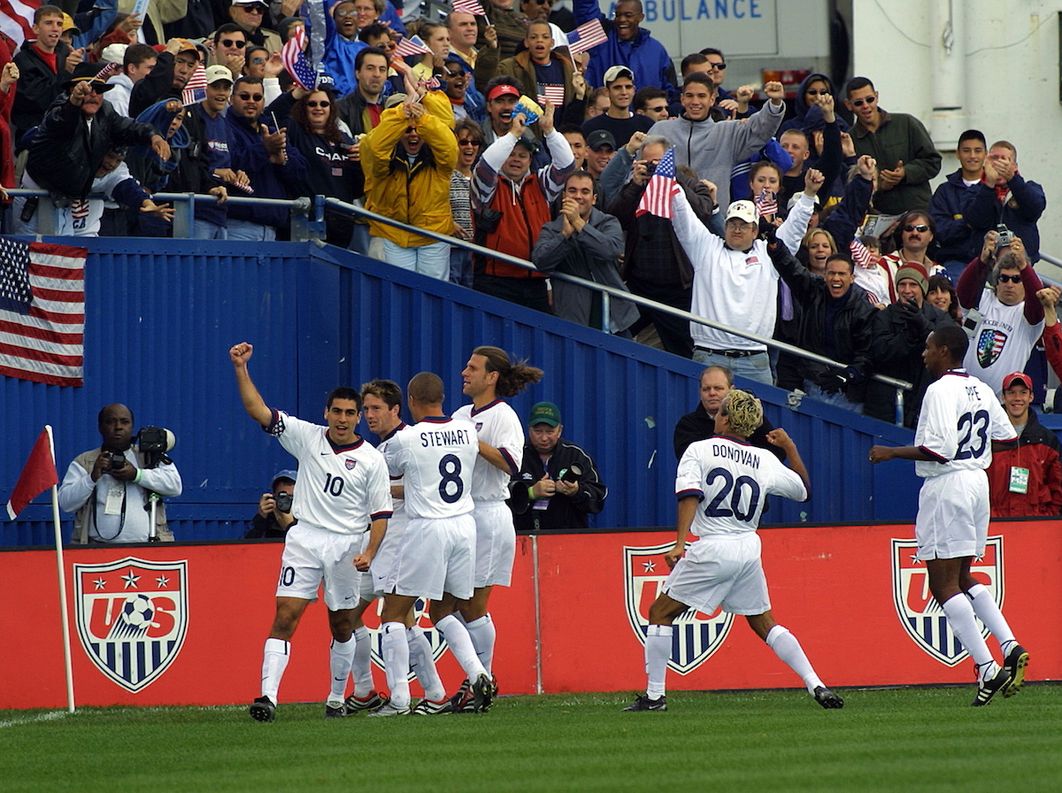
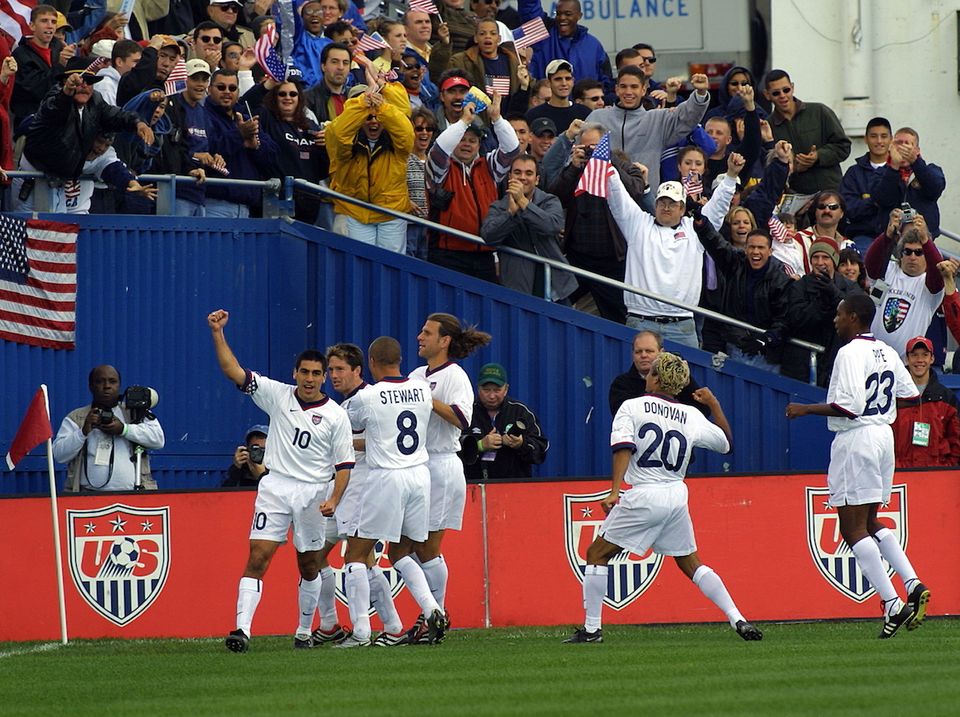


To celebrate the 20th anniversary of the USMNT’s memorable run to the quarterfinals of the 2002 FIFA World Cup, ussoccer.com presents a two-part series looking back on the team’s best modern era World Cup finish.
First, a look back at the World Cup Qualifying campaign:
As the U.S. and Mexico teams stood in the tunnel at frigid Columbus Crew Stadium on Feb. 28, 2001, the opposing goalkeepers lined up next to each other.
Brad Friedel, who grew up 2 1/2 hours away in Bay Village, Ohio, was clad in long sleeves, shorts and goalkeeper gloves. He noticed what his rival, Jorge Campos, was wearing.
"He looked over at me and he just said the word, ‘loco,’" Friedel said. "When I saw him, he had hand warmers on plus goalkeeping gloves. He had three pair of bottoms, two pair of tights and then long pants. He had a neck warmer ... definitely a T-shirt on, like a thermal thing. He was like the Stay Puft Marshmallow Man. He couldn't even move because he had so many clothes on."
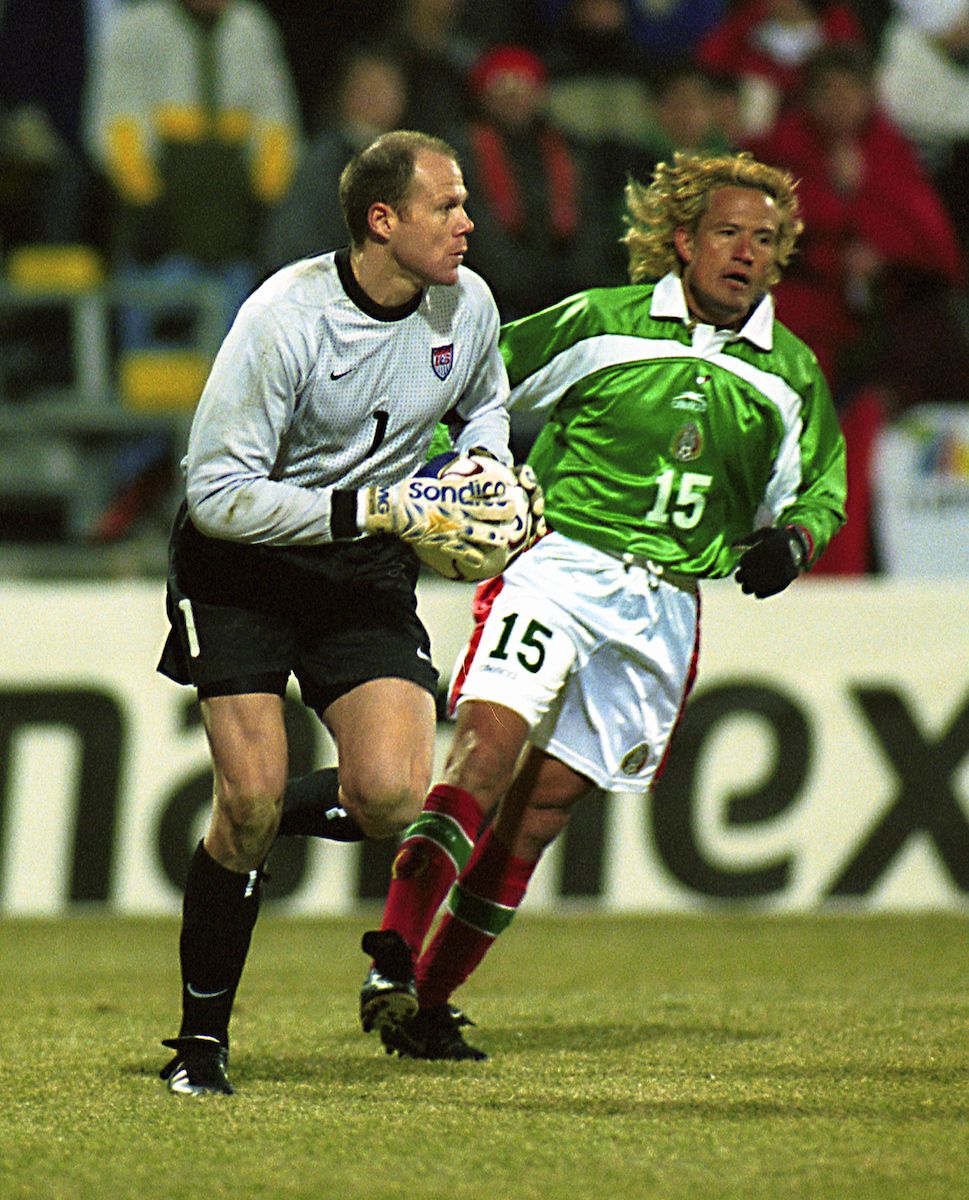
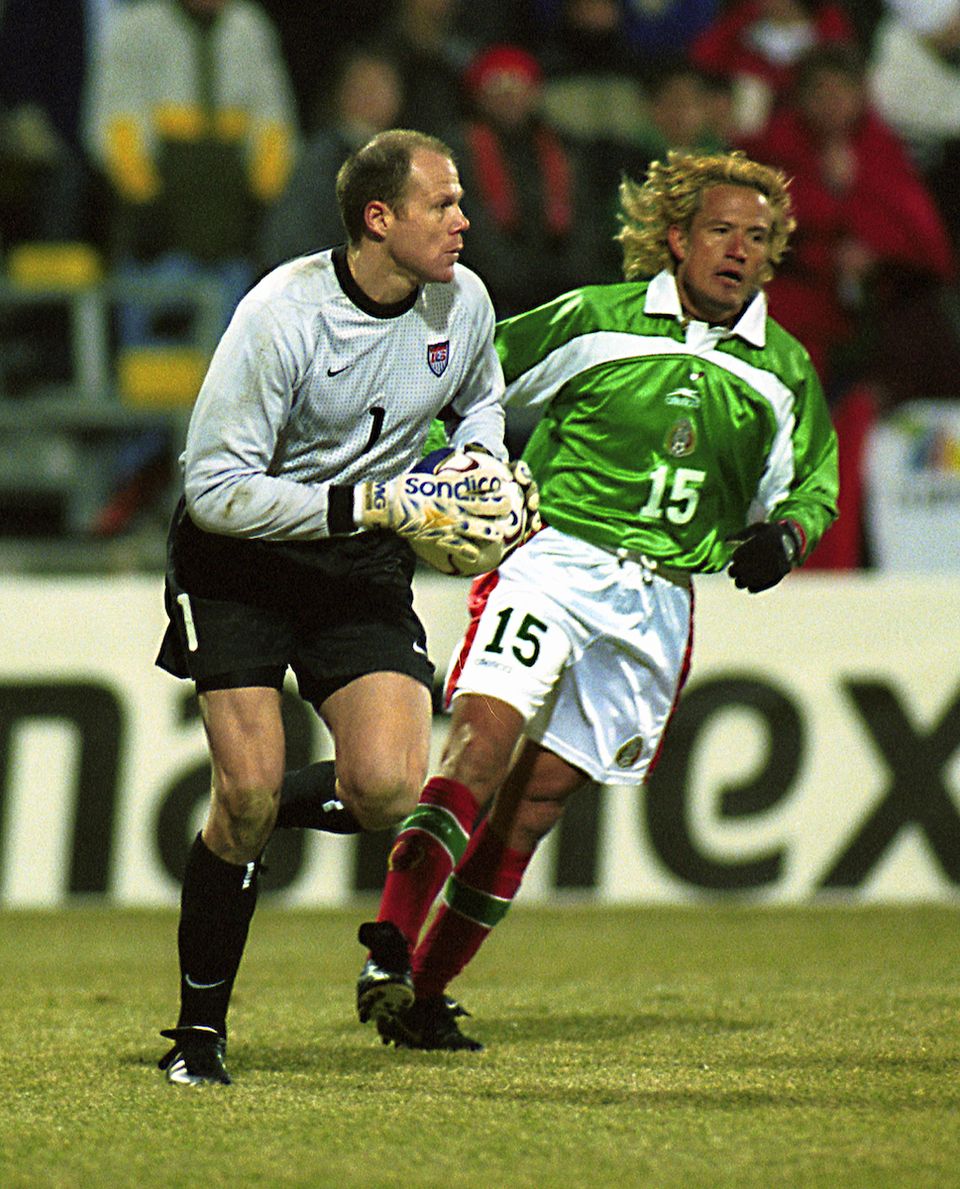
After years of struggling through arduous conditions in Central America and the Caribbean, U.S. Soccer used some gamesmanship of its own.
It worked to perfection as the Americans froze out Mexico, kicking off the Hexagonal for the 2002 World Cup in Korea/Japan with a 2-0 triumph. That legendary confrontation became the first of five “Dos a Cero” results in FIFA World Cup Qualifying in Ohio.
Months before that USA-Mexico clash, the USMNT was subjected to a harsh Concacaf learning curve that included a game in the middle of a jungle, a confounding phantom hand ball that cost the team a point and playing a qualifier on a field that was in horrendous shape.
"Every step of the way is challenging," said Bruce Arena, then the U.S. head coach. "At that time, there were fewer regulations. Every country is trying to get a competitive edge. The United States rarely thought about that.
"They didn't cut the grass. The officiating stinks. We go to Costa Rica, we got cheated at the end with the penalty call. So classic stuff. Fans throwing things at us. The bathrooms in the locker room that weren't cleaned, probably for weeks. You could throw up walking in there. All of that kind of stuff before you even step on the field."
U.S. Men's National Team head coach Gregg Berhalter, who also experienced WCQ as a player, has a mantra: "Stay calm and realize that you expect the unexpected."
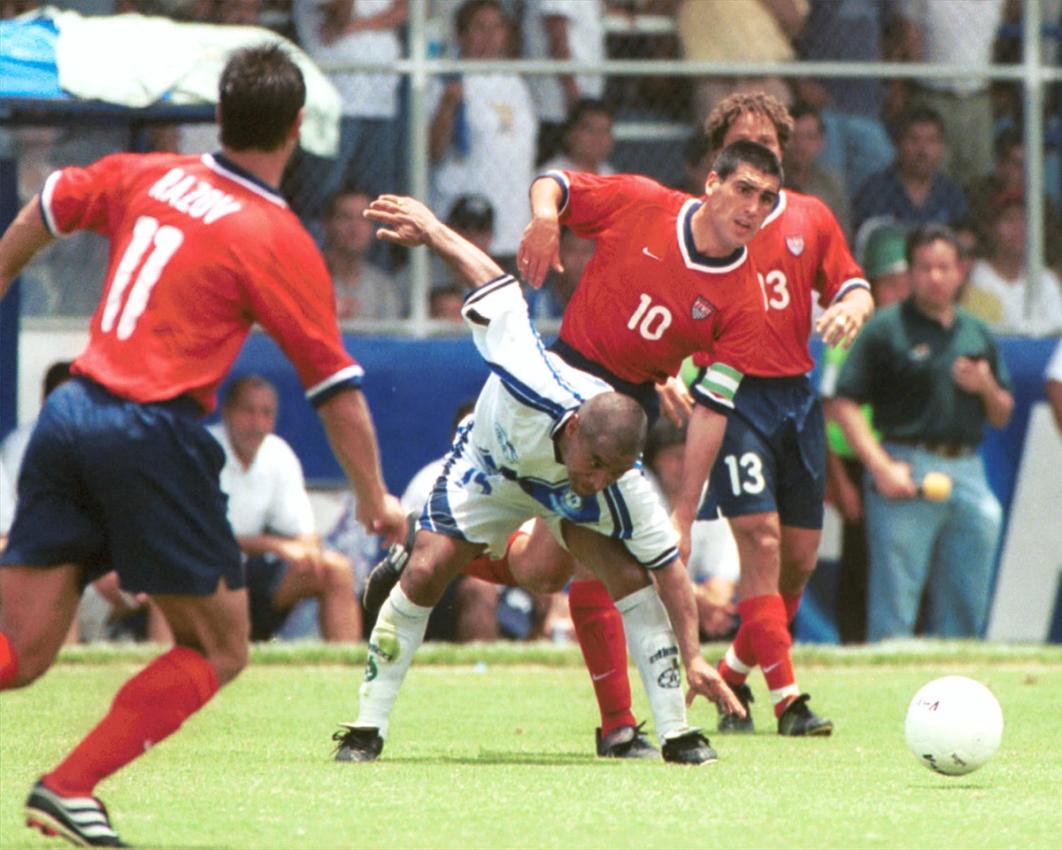
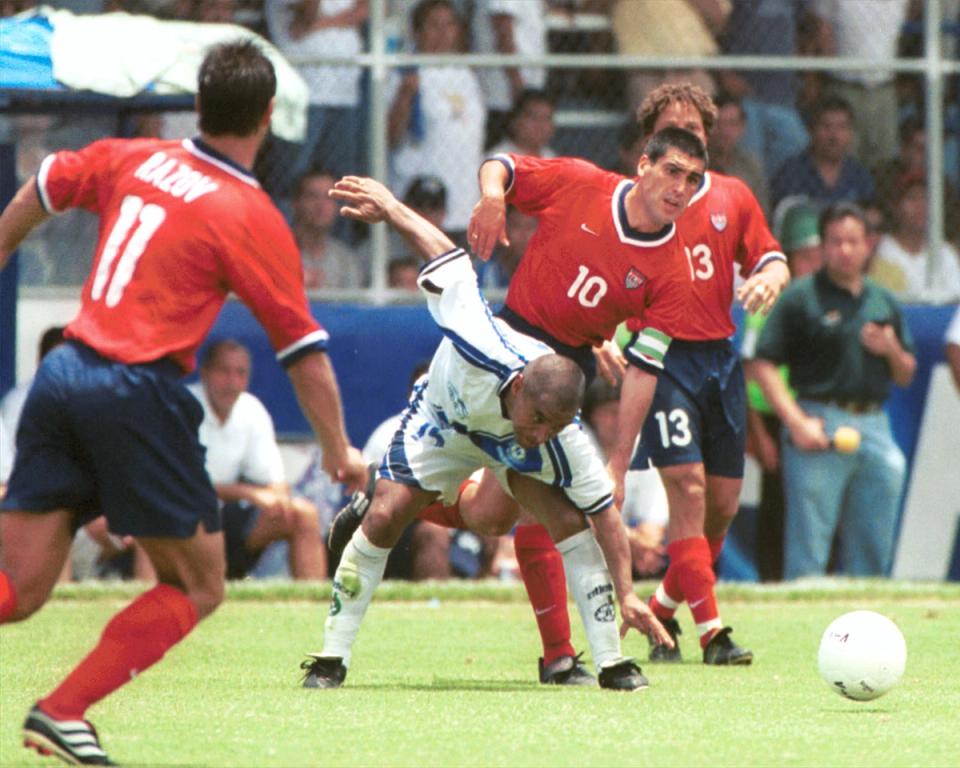
"Concacaf throws you sort of unexpected challenges as you go through it," said midfielder Claudio Reyna, who captained the 2002 World Cup squad. "The travel. The fields are far worse than they are today. Most would say all the national teams have improved the surface of their field. The game was refereed different from game to game.
"Similar to what you saw on this most recent cycle, you never knew who was either going to be fit or whether somebody was suspended. There's very little continuity in qualifying, unlike a club team, because you're just getting together every couple of months. That really is the challenge. It's a grind. You're just never really getting into a momentum."
After the USA’s last-place showing at the 1998 World Cup, Arena was charged with getting the team back on track. Arena was viewed as the perfect choice after directing D.C. United to the first two MLS Cup championships and into a third final.
"One of Bruce's major qualities is putting a collection of guys together that becomes a group," midfielder Earnie Stewart said.
Arena used 37 players during the qualification run, including four goalkeepers.
The USMNT kicked off semifinal round at two demanding venues - Guatemala and Costa Rica.
Instead of playing at the national stadium in Guatemala City on July 16, 2000, the Guatemalan federation, in a last-minute switch, selected Mazatenango, a town of about 40,000 situated in the jungle and near active volcanoes. The only way to get there was to fly into Guatemala City and take a three-hour bus ride.
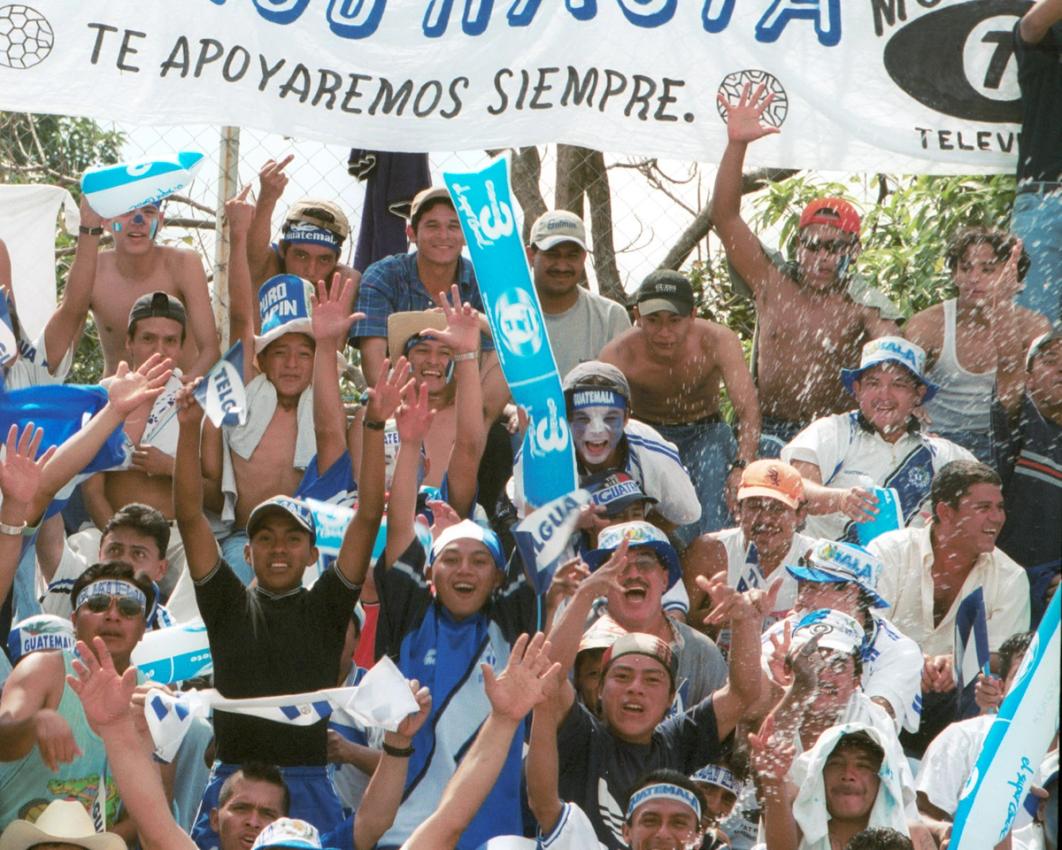
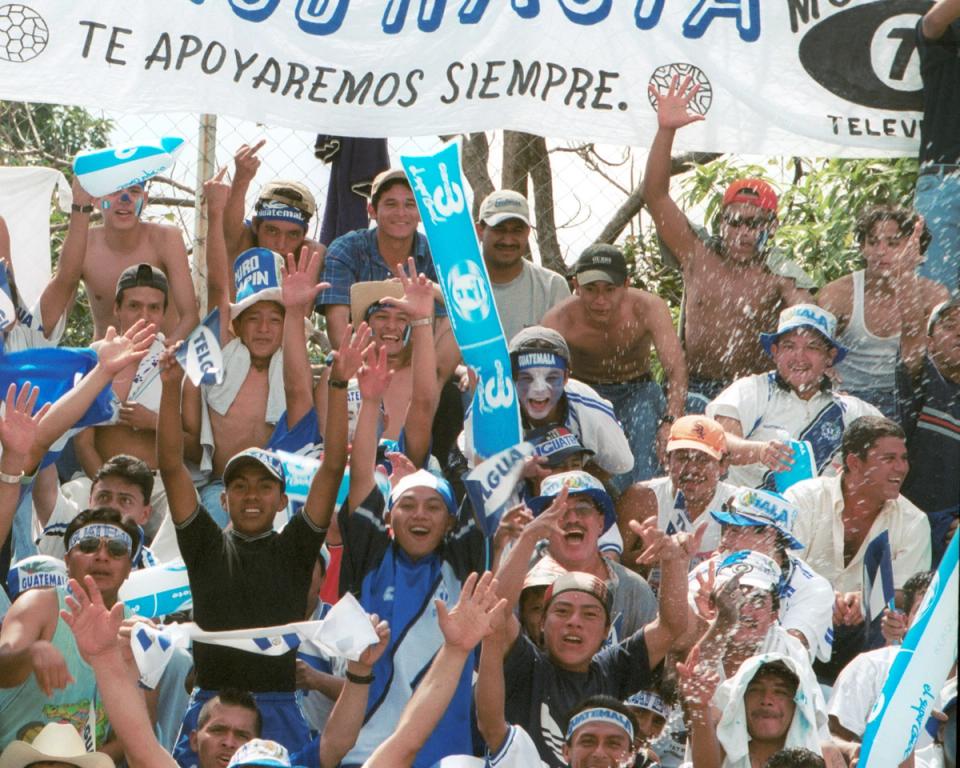
"I'm sure that one has to go down as gamesmanship at its highest level," defender Eddie Pope said. "I believe that they got in trouble for that. You're only supposed to be so far from your national airport."
Compounding the challenge were local DJ's playing music until 1:30 a.m. outside the heavily guarded U.S. motel-restaurant, using a PA system "which did not help us sleep-wise," midfielder Earnie Stewart said.
"People were lined up outside of the facility," Pope said. "They were playing the music on the huge speakers and throwing M-80s into the compound. The cold water was not working. There was only scalding hot water. AC, I can't remember if that was working. It pretty much checked every box in regards to gamesmanship that they possibly could."
Arena did not have his optimum lineup. Four starters were sidelined, including forward Brian McBride (broken cheekbone) and Joe-Max Moore (knee), Ben Olsen (sprained ankle) and defender Jeff Agoos (knee surgery). Early on, Pope injured his left knee and was subbed.
In a match punctuated by sweltering heat (93 degrees), humidity and questionable referee decisions, the Americans walked out of Estadio Municipal Carlos Salazar with a 1-1 draw in front of a sellout crowd of 9,000 and curious souls watching from nearby rooftops.
Ante Razov scored his third international goal, a 17-yard deflection in the 45th minute. Carlos Ruiz, who became a major force with the LA Galaxy, connected for the 88th-minute equalizer.
"It seemed like we ran out of gas," Stewart said. "The heat started to play a role later on in the game."
The degree of difficulty became greater at Costa Rica on July 23.
Just getting to Estadio Saprissa was a surreal journey.
"There were riot police on horses, beating people down," Berhalter said. "That amount of people outside the stadium, and how aggressive they are to the opposing team is something special. I mean, it is crazy. The fans were lined on the streets and just going crazy. At Saprissa, its special because you have to wind into the stadium, really condensed and the bus can't move. And there's all these people. It makes it crazy.”
So was the crowd inside the stadium.
Stewart claimed Saprissa, not Estadio Azteca in Mexico City, was the USA’s most difficult venue.
"Fans were on right on top of you," he said. "The field was not good. It was really difficult to play. It was always the hardest place to play in Concacaf."
Rolando Fonseca's eight-yard header gave the Ticos a 10th-minute lead, but Stewart equalized, slotting home a rebound off a Razov shot in the 65th minute.
As the game inched closer to full time, U.S. TV announcer Ty Keough surmised that Frankie Hejduk's ill-advised trip on Austin Berry in the penalty area in the 89th minute could result in a make-up call. He was spot on.
A minute later, Hernan Medford sent a cross into the area that Berhalter headed out of bounds for an apparent corner kick. In a still dumbfounding decision, referee Peter Prendergast ruled a handball and pointed to the penalty spot.
"I remember right after the play actually holding my temple because that's where I got hit," Berhalter said. "It stung a little and I'm rubbing my temple. I look and he's pointing to the penalty spot. This can't be."
This was years prior to Video Assistant Referee, so the USA had to live with the call.
Medford converted the PK past goalkeeper Kasey Keller. Several minutes later the Costa Ricans secured a controversial 2-1 victory.
Arena and Reyna went ballistic. They needed to be restrained by security guards and U.S. team officials from going after Prendergast.
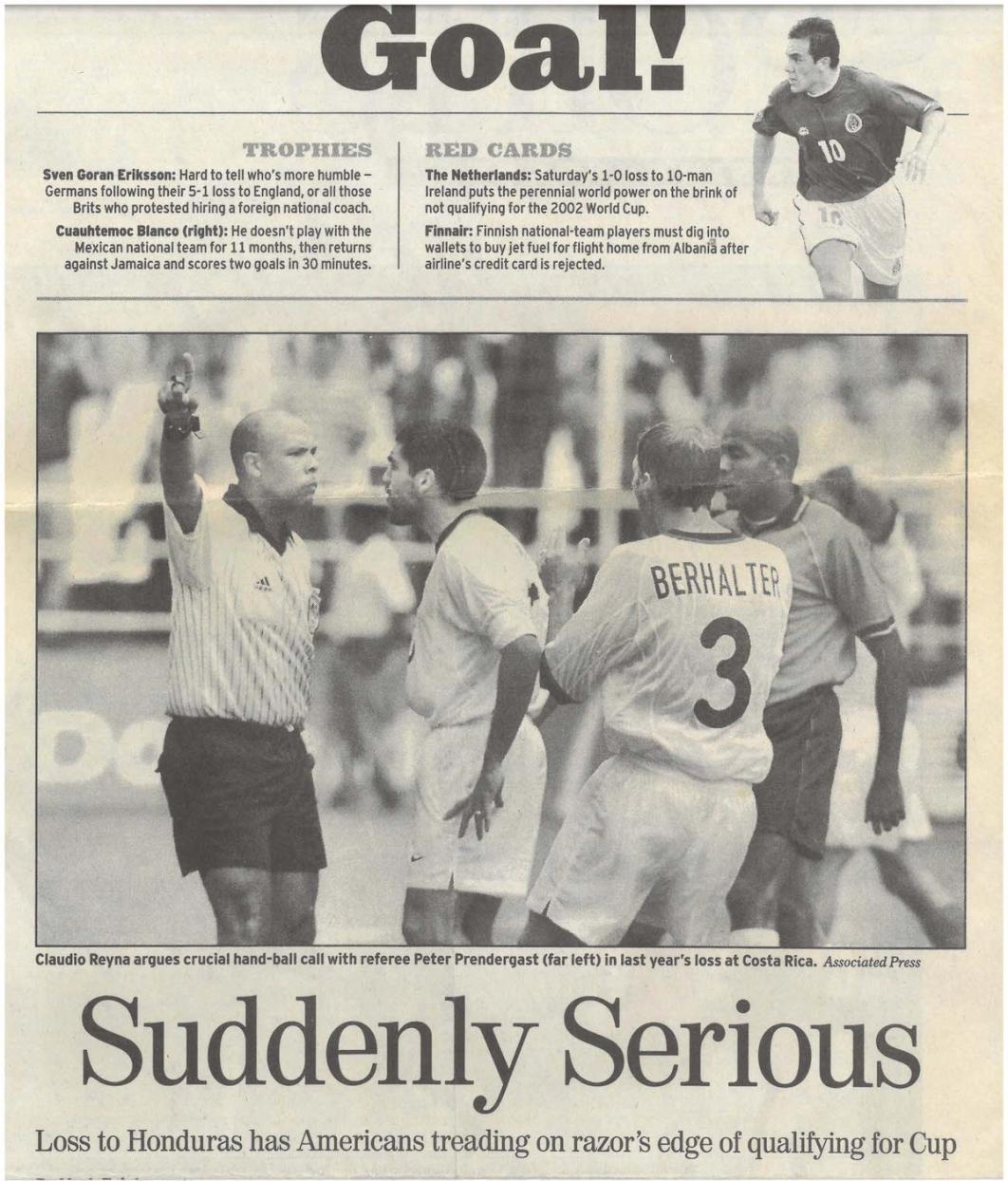
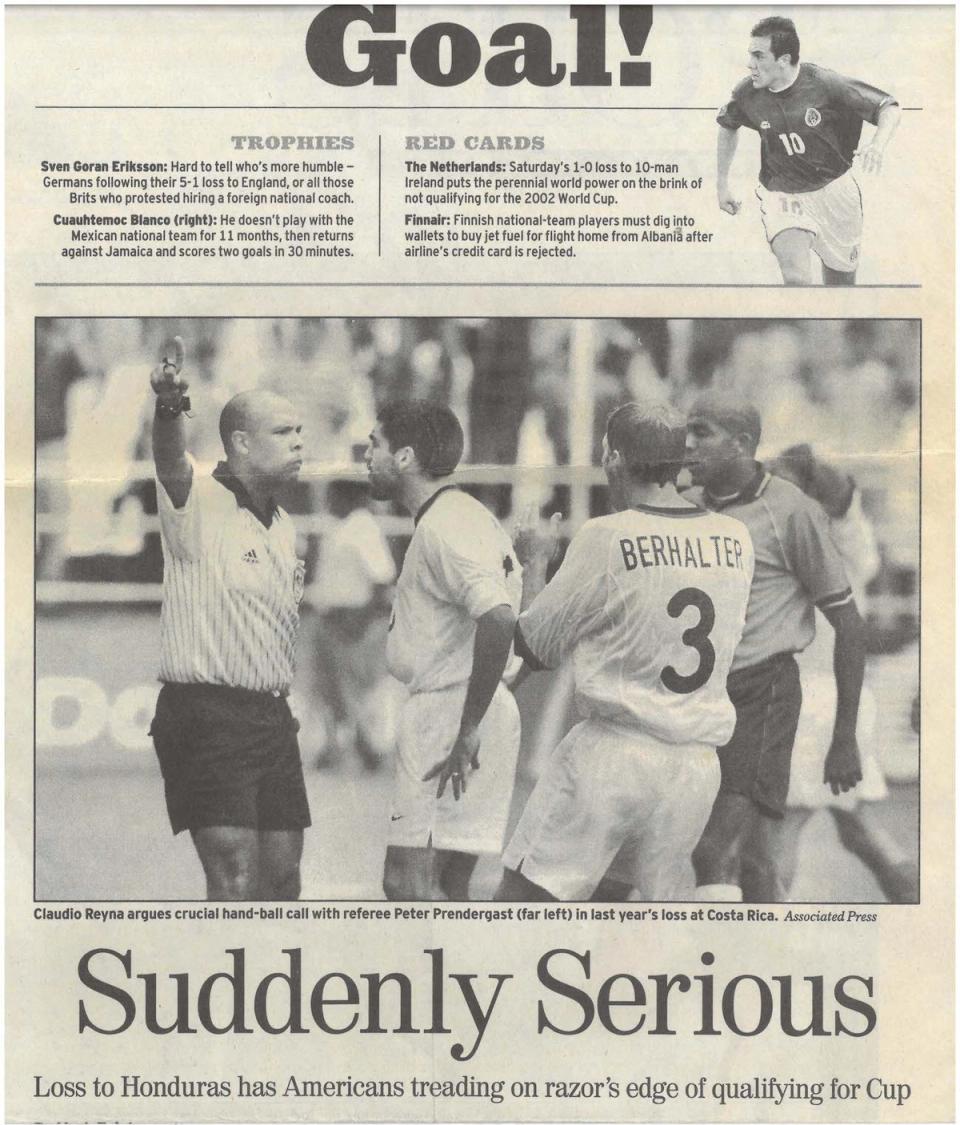
"I told him he cheated us," Arena said before storming out of the post-match press conference. "The call was disgraceful" and "that's not the way to decide a game."
Reyna threw his captain's armband at Prendergast. "Concacaf referees are miles behind the rest of the world," he said at the time. "I don't think the referee was awful the whole time, but that particular play was the game. It was terrible."
That set up a must-win situation in the USMNT's first home game against Barbados in Foxborough, Mass. on Aug. 16. Taking advantage of two red cards late in the opening half, the U.S. rolled to a 7-0 triumph.
"Getting early goals against teams like that, where the longer the game goes on, the more momentum they build, the more confident they get and you're in a little bit of trouble," said Pope, who started the rout, heading in Stewart's 11th-minute corner kick. "Can you break the seal early? And then hopefully the rest will come."
McBride, making his first appearance of the 2002 qualifying cycle, doubled the margin in the 28th minute. The partisan crowd gave the USA a three-minute standing ovation. Joe-Max Moore tallied twice. John O'Brien, Tab Ramos and Stewart also found the net.
In another must-win scenario, the USMNT faced Guatemala at RFK Stadium in Washington, D.C. on Sept. 3. This time the Americans tried some gamesmanship of their own. Organizers sold tickets for the field seats to USA supporters and groups and placed the Guatemalan fans in the upper decks.
A number of over-enthusiastic U.S. fans also got into the act off the field. Their plan was called Project Mayhem - as they ran through the hotel and made noise on the Guatemalan team’s floor in suburban Virginia, the night before the game.
For most of a hot and muggy afternoon, a frustrated American side could not solve Guatemala. It got worse when Eddie Lewis was shown a 65th minute red card for throwing an elbow at Fabricio Benitez, forcing the USA to play the rest of the way a man down.
McBride lifted their spirits with a spectacular 72nd-minute strike in a 1-0 victory, sliding to put home Cobi Jones' cross from the right. "We had to bear down," McBride said. "We did not have any time to get worried."
On Sept. 15, FIFA suspended Arena and Reyna for three and two games, respectively, for their behavior in Costa Rica – almost two months prior. Arena was slapped with a $5,000 fine, Reyna with a $3,500 one.
That left assistant coach Dave Sarachan in charge. Arena sat in the stands along with 24,430 spectators at Columbus Crew Stadium in a scoreless draw with Costa Rica on Oct. 11.
Asked if he would do anything different away from the bench, Arena replied, “Cursing on the sideline as opposed to be cursing in the stands."
Arena held a media blackout on his roster announcement. In some gamesmanship to counteract those Central American antics, Arena didn't release a roster as of Monday afternoon for the Wednesday night game. Arena wanted to give Costa Rica as little time as possible to prepare.
Actually, it was easier to figure out who wasn’t going to participate. Already without the suspended Arena and Reyna, the U.S. was also missing McBride, due to a blood clot that was discovered in his arm, as well as suspended midfielders Eddie Lewis (red card) and Earnie Stewart (yellow card accumulation). The 0-0 draw set up a another must-win scenario at Barbados on the final day of the semifinal round.
A day before the Nov. 15 confrontation, both teams weren't allowed to train at the National Stadium in Waterford, Barbados because the field was in such terrible shape. The Americans walked on the pitch, which featured a pop-up sprinkler system that players could trip over.
"There were glass and rocks on the field," Arena said. "They told us they weren't sure if we could warm-up on the field because they didn't want us to mess it up."
Added Berhalter: "The field was probably one of the worst 've ever played on. It had four-inch high grass at places, dirt in other places. It was horrible."
Deciding against bringing Friedel or Keller from Europe, Arena chose Tony Meola, who marshalled the Kansas City Wizards to the MLS Cup title exactly a month prior. Meola’s last qualifying appearance came 11 years prior -- backstopping the USA in the famous 1-0 triumph at Trinidad & Tobago to boost the Americans into their first World Cup in 40 years on Nov. 19, 1989.
Meola kept his end of the bargain as the teams battled to a scoreless halftime deadlock.
"We're sitting there and we're looking at ourselves because it's 0-0 and everybody's like, 'We're out like this,' " Stewart said.
"Facing elimination if you don't win that game is scary," Berhalter said. "At halftime, Dave was really calm. We were confident."
Things got scarier shortly after the break when Llewellyn Riley’s 50th minute shot was initially saved by Meola, only to rebound off center back Carlos Llamosa and careen off the cross bar.
Disaster averted, the U.S. final got on the scoreboard after the hour mark. Clint Mathis, who had recently completed a stellar season with the MetroStars, broke the ice in the 63rd minute, slotting home a right-wing cross from Moore. Stewart hit a 16-yard rocket in the 73rd minute. Cobi Jones connected four minutes later. Razov closed out the scoring two minutes into stoppage time.
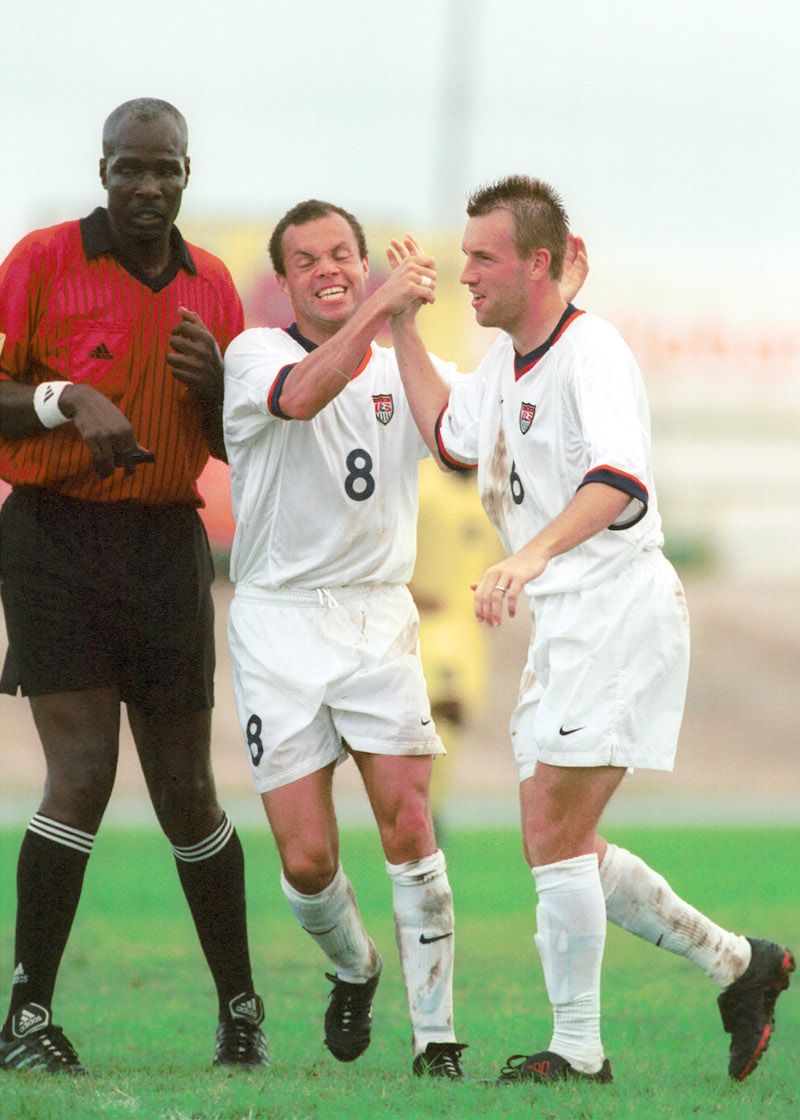
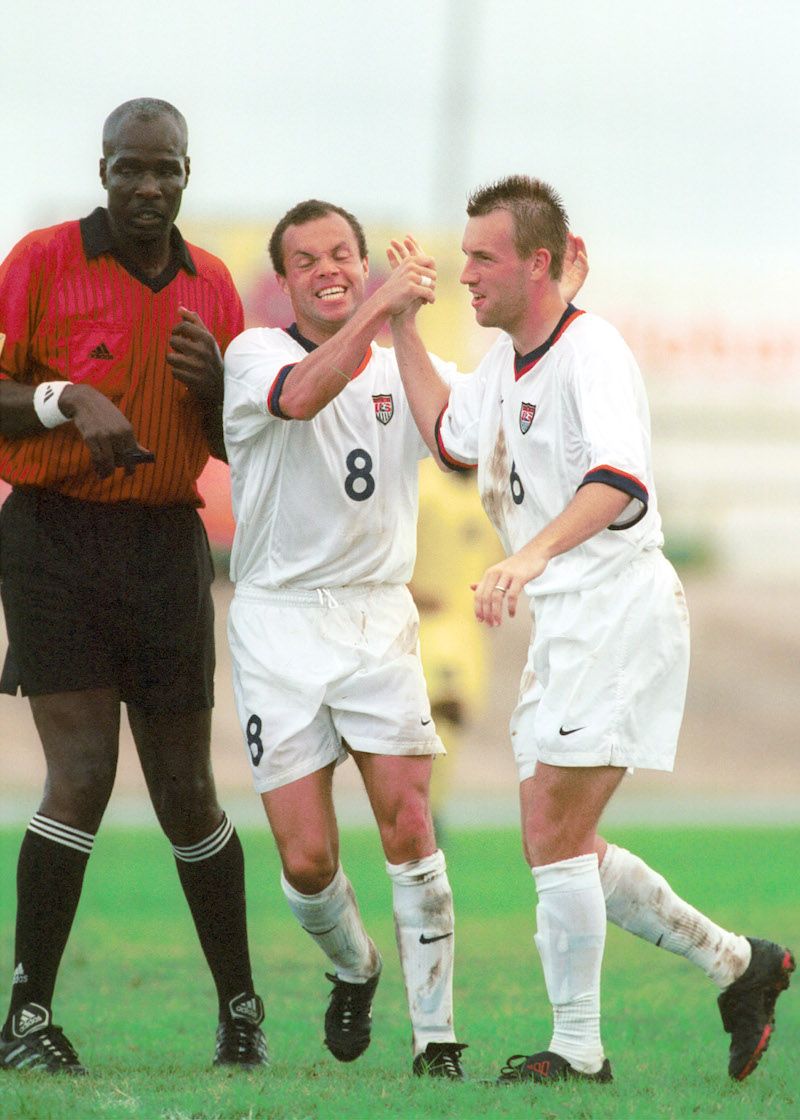
"I try to say this with the most respect, but it wasn't necessarily the opponent at the time that was hindering us," Stewart said. "The opponent was the field, it was the conditions, it was the environment. But once we had the first goal, it became really comfortable.”
Added Mathis: "The guys did really well. No matter who you're playing, we had to win this game. You can't depend on another result.”
Sitting second going into the final matchday, the win saw the U.S. finish on top of its semifinal round group, while Guatemala’s late 2-1 victory over Costa Rica forced a one-game playoff between the two sides two months later. Costa Rica would win it 2-1 in Miami, advancing to the Hexagonal alongside the U.S.
***
Jorge Campos wasn't the only Mexico player who had trepidations about playing in the cold of Columbus, Ohio in the Hex opener on Feb. 28, 2001. The entire team never came out for warmups, instead deciding to prepare for the match in the locker room.
"Most of us grew up in areas where it gets quite cold in the winter. It's not really a big deal," Pope said. "You're eight or nine-years-old on the soccer field and you're playing in very cold temperatures. We were used to it. Mexico made the mistake of warming up inside. It's like sitting in your car before you go outside. When they came out for the national anthem, they weren't used to it. It looked like they were freezing to death."
A half hour into the match, it didn’t look good for the U.S., which had lost its best scoring threat, McBride (swollen eye), and best playmaker, Reyna (strained groin muscle).
The two that replaced them – Georgia boys Josh Wolff and Clint Mathis – linked up for the opening goal just after halftime. Mathis sent a looping ball over the top for Wolff, who moved past his former Chicago Fire teammate Campos, before finishing into the empty net.
Late in the game, Wolff – who had just four caps prior – set up Earnie Stewart to complete the first “Dos a Cero” in Columbus.
"I was fortunate enough to score against Mexico in Los Angeles at the end of 2000," Wolff said. "So, there was some familiarity there."
It was only the third time the U.S. had beaten El Trí in qualifying. The last time was a 2-1 win in Fort Lauderdale on Nov. 23, 1980, and that was after the Americans were eliminated.
"Obviously, it was huge," Arena said. "They were a team that had our number of years so to win that game and to have outstanding support in Columbus, it was a great day for U.S. Soccer."
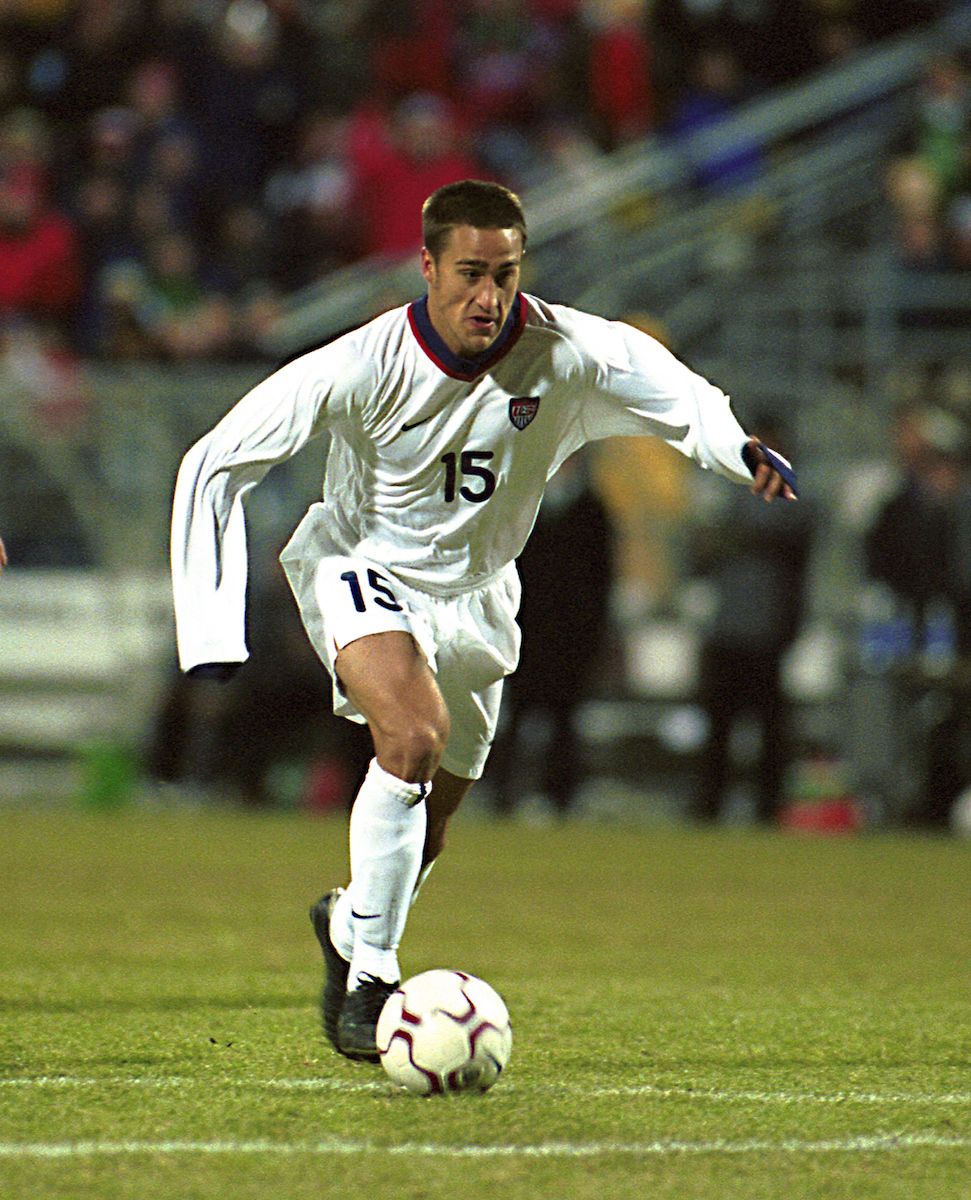
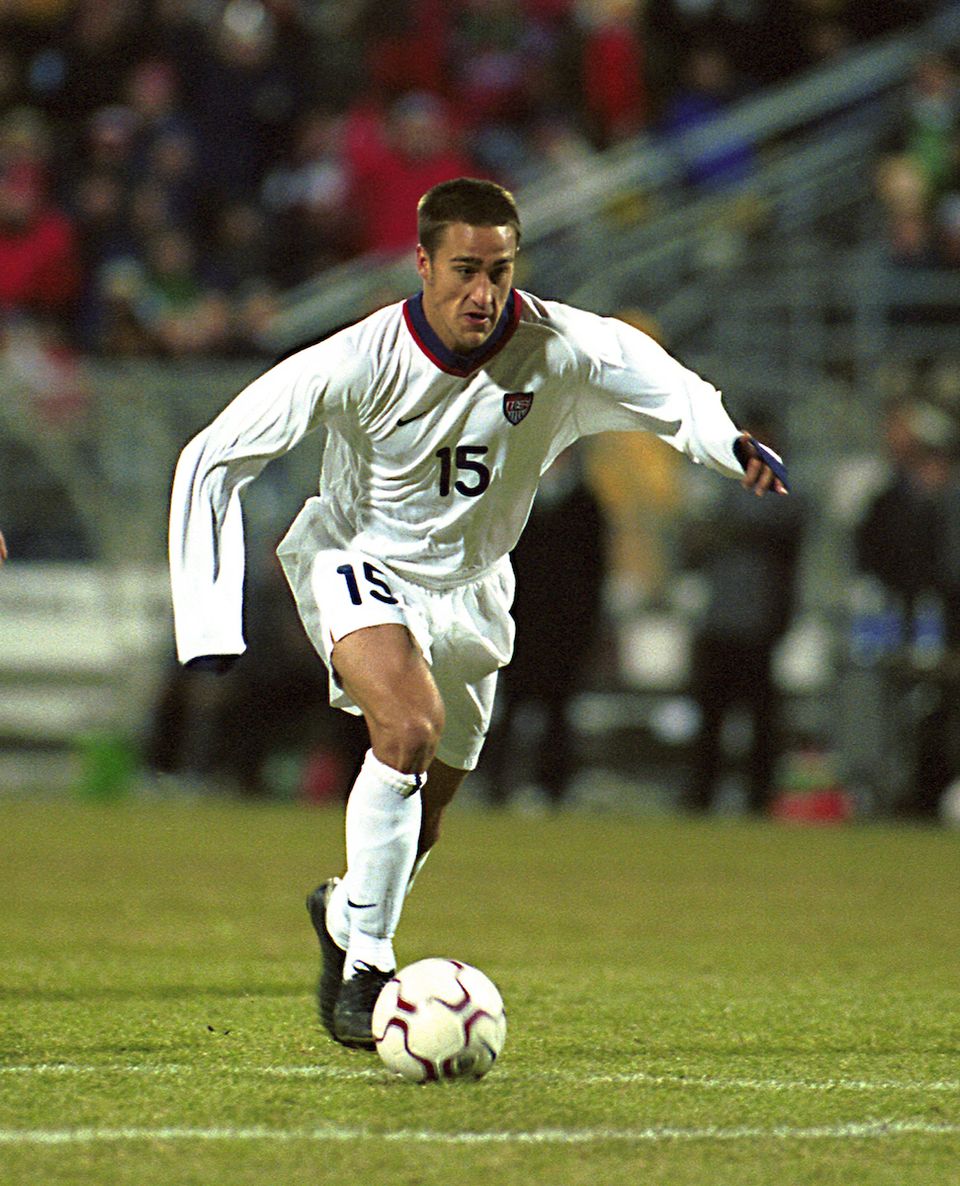
The result sparked the Americans to a fabulous start to the Hex.
"We ran with it to three good results," Wolff said. "The group was off and running. That had a big influence and gave the American fans and soccer community good belief."
On March 28, the USMNT recorded a 2-1 triumph over Honduras in San Pedro Sula, the first time the team had won in Central America in 11 1/2 years (since a 1-0 WCQ victory over El Salvador in Tegucigalpa, Honduras on Sept. 17, 1989).
Arena named Stewart captain, which coincided with the midfielder's 32nd birthday. Stewart celebrated by connecting for a 33rd-minute goal. Mathis set up Stewart, who rifled a slightly arching 30-yard drive.
"Those times that I was captain, I did that with a lot of pride. … That's something I'll never forget. Winning on our birthday and being able to captain the team was something that was special."
After the Hondurans equalized on Julio Cesar de Leon's 59th-minute tally, Mathis scored the game-winner in the 87th minute on a 22-yard free kick.
"Any time you score a goal of this magnitude in a World Cup qualifier, it's a great feeling," he said.
The USA made it three consecutive wins with a 1-0 victory over Costa Rica in Kansas City, Mo. on April 26. At the postgame press conference podium, Wolff had a smile that would have made the Cheshire Cat proud. He knew that he and his teammates had gotten away with one - a handball that wasn't called, which led to the lone goal in the 70th minute.
TV replays showed that the ball had hit the left arm of Mathis before Wolff poked it home from three yards. When asked if he thought it was a handball, Wolff replied, "I didn't see anything," while breaking into a cheesy smile.
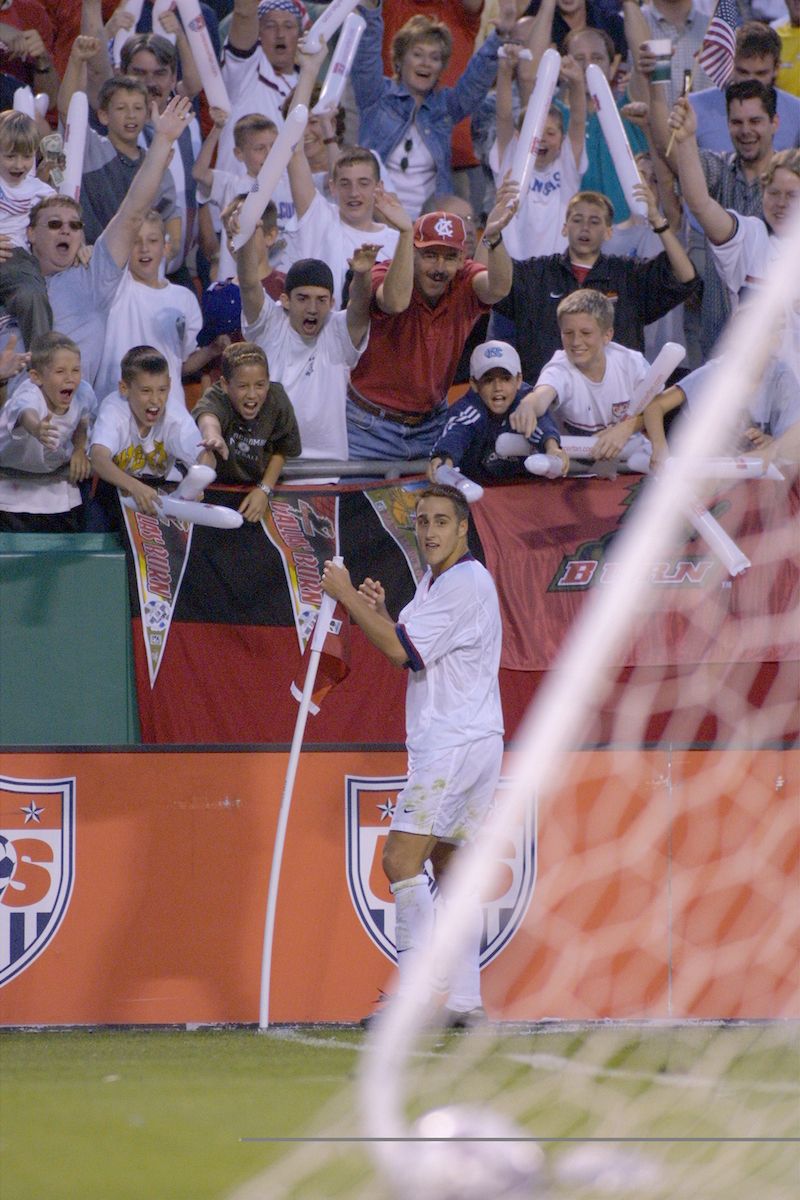
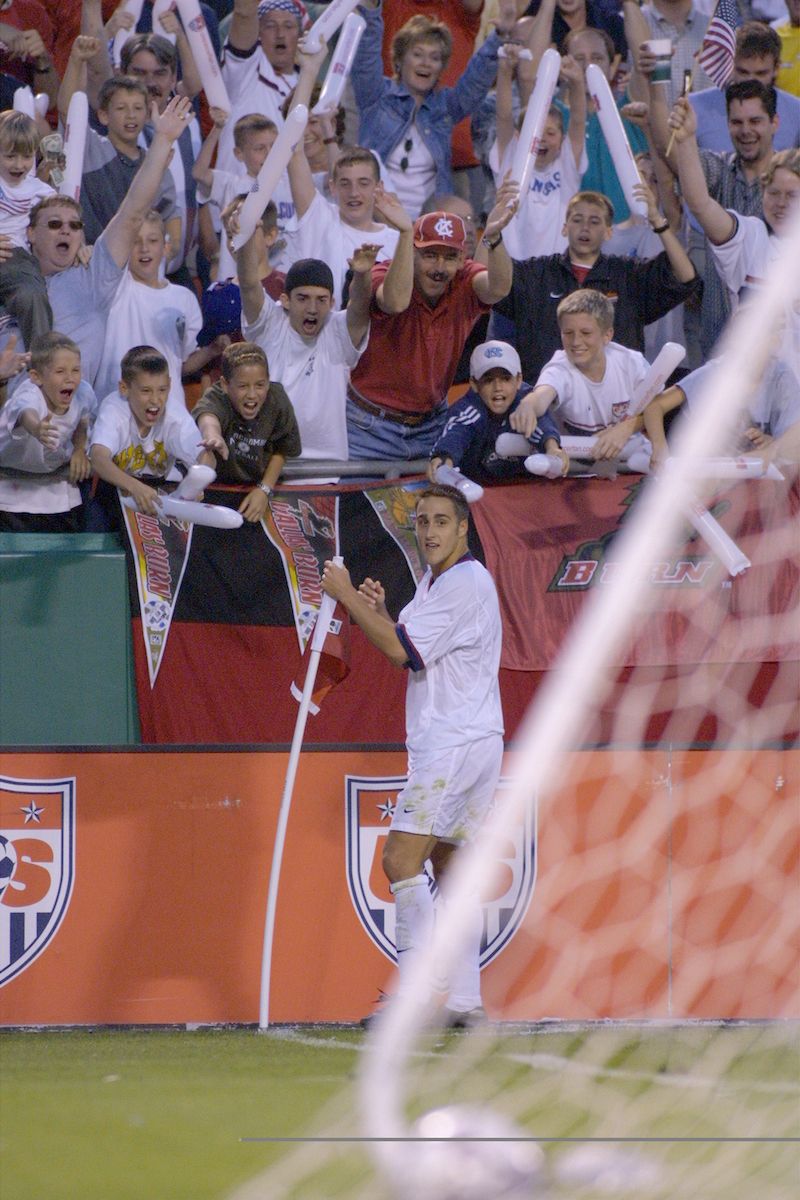
The Americans became the sixth Concacaf team since 1950 to roll off three successive wins to open the final round.
The USA had a month and half off before playing twice within a five-day period. However, two catalysts of the early wins, Mathis (torn ACL) and Wolff (fractured left foot), were sidelined for the rest of qualifying campaign.
If they could win twice, the Americans would have 15 points, considered to be the magic qualifying number. That would have been accomplished only halfway through their 10-game schedule.
"There is a buzz," midfielder Chris Armas said. "You hear different guys saying, 'Can we clinch with the next two wins?' Everyone is thinking it and feeling it but it's not going to get any easier."
Entering the June 16 encounter, Jamaica was riding a remarkable 50-game unbeaten streak at its National Stadium in Kingston, dubbed "The Office." The last foe to emerge victorious? The U.S., behind a 3-0 win on Nov. 22, 1994.
Stadium gates opened at 6 a.m. with some of the country's favorite Reggae stars entertaining the fans until kickoff. Most of the crowd of 32,000 was a sea of yellow, wearing national colors, with a strong aroma of marijuana punctuating the air.
The USA could not break the streak, emerging with a scoreless draw and a road point as temperatures soared toward 100 degrees on a rock-yard surface, which didn't make for pretty soccer.
"It's a great result because we're taking away two points from Jamaica at home," Reyna said. "We're sitting really good right now."
The Americans continued their unbeaten streak on June 20, with a 2-0 win over Trinidad & Tobago in Foxborough. Razov scored only 74 seconds after kickoff, the fastest U.S. qualifying goal in at least a dozen years. Stewart added an insurance tally in the 20th minute, becoming the U.S.'s all-time scoring leader (seven goals), snapping a tie with National Soccer Hall of Famer Willy Roy.
"Fantastic," Stewart said at the time. "Thirteen points out of 15 - can't get much better than that. This is a great start."
With five games remaining in the Hex, the USMNT (4-0-1; 13 points) enjoyed a commanding lead and were on the verge of qualifying. But the squad started a downward slide via a 1-0 loss at Mexico, with a new coach, Javier Aguirre, in charge, at Estadio Azteca on July 1.
The USA wasn't helped when John O'Brien's club, Ajax, refused to release the midfielder, citing that he needed to train for its UEFA Cup qualifying tournament. This was prior to FIFA setting WCQ playing dates.
"It's a classless thing to do," Arena said at the time.
A botched offside trap allowed Jared Borgetti to score off a 12-yard header in the 16th minute past Keller.
"We were the most dangerous Mexican player," defender Jeff Agoos said of the defeat. "I don't think we deserved to win. We were our own worst enemy."
The Honduras match at RFK Stadium on Sept. 1 was to start at the unappealing hour of 10 a.m. An early kickoff may sound like gamesmanship to try to get the upper hand, but with ESPN having the TV contract, it was the only time the game could be televised on the first college football Saturday of the season.
When Pope walked out for the pregame warm-up, he expected to hear the 54,032 fans cheering. Instead, Honduran fans dominated the venue.
"That's a perfect example of you accidentally putting it in the wrong location," he said. "Your intentions are to tactically make it a home crowd, and it is the opposite. We see all these white and blue shirts. That had an impact. You're looking for your fans. The stadium now is louder for the other team, and you end up playing an away game at home.
"You've already experienced being away and taking the abuse from the other team's fans. Now you're at home. You look up and you're looking for your fans. It can be deflating."
Nineteen-year-old Landon Donovan made his World Cup Qualifying debut that day. “My introduction was like, oh [crap], this is real stuff,” he said. “It just was different than anything I've ever seen in my life. It was a crazy experience.”
At times the Americans played as though they were sleep walking on defense in a devastating 3-2 loss. Stewart found the net in the seventh and 84th minutes, but it was the goal that he didn't score that haunted the hosts. His PK was saved in the 43rd minute by Noel Valladares, switching the momentum.
"It's not so much missing a penalty kick,” Stewart said at the time. “It's when you look at your teammates and see that you've let them down."
Instead of enjoying a 2-1 halftime lead, the U.S. saw its fortunes sink when Carlos Pavon converted a 53rd-minute penalty. Milton Nunez also tallied for Honduras (27th and 77th minutes).
"The most painful thing is actually we started off well," Stewart said. "We didn't score, had the chance to go up and then I missed the PK. Those really weigh on your mind. Then they started to play really well."
It was the U.S.'s second consecutive qualifying loss, the first time that happened since 1980. The Americans also saw their 19-game home qualifying unbeaten streak broken, losing for the first time since May 1985. They allowed three goals in a home qualifier for the first time since 1960.
Four days later in Costa Rica, the U.S. deployed a revamped lineup that played like it wanted to get out of Saprissa with a scoreless draw in what turned into a 2-0 loss. Ronaldo Fonseca had a brace (40th and 68th minutes).
***
When the USMNT walked onto the Foxboro Stadium field in on Oct. 7, the players knew they were shouldering a massive responsibility.
Beyond the fact they needed to break a three-game losing streak and bolster their chances of qualifying – a loss would have eliminated them from contention - the Americans knew they were playing for their country as well.
The nation was still grieving after the horrific terrorist attacks on the World Trade Center, the Pentagon and a plane that crashed in Shanksville, Pa., which left almost 3,000 dead and an estimated 25,000 injured on Sept. 11.
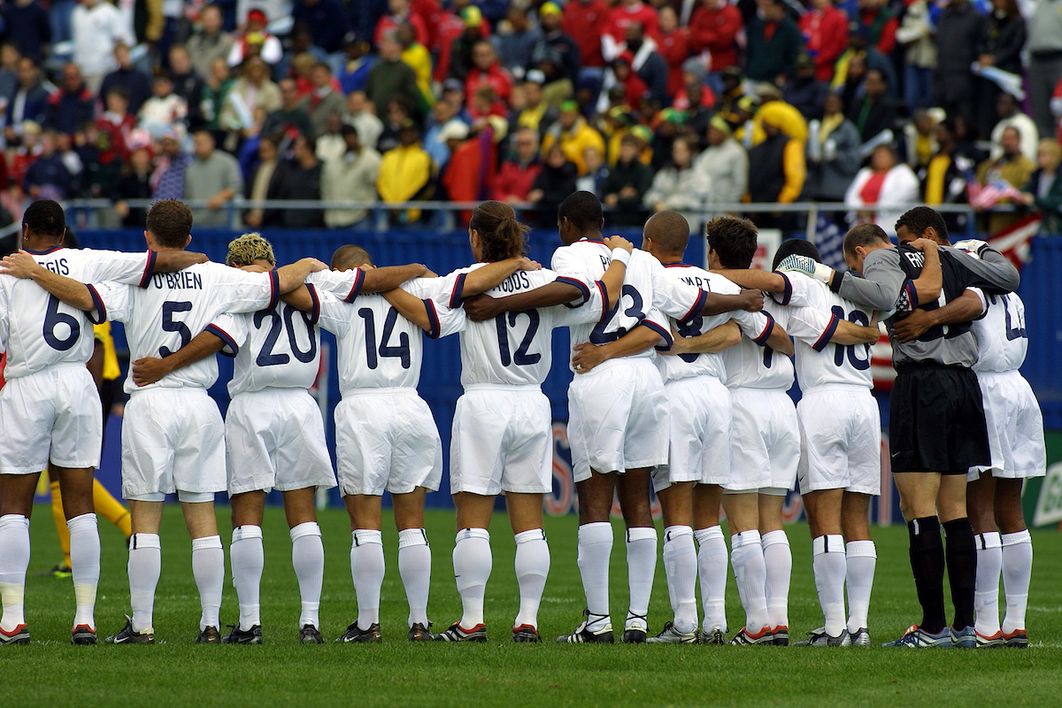
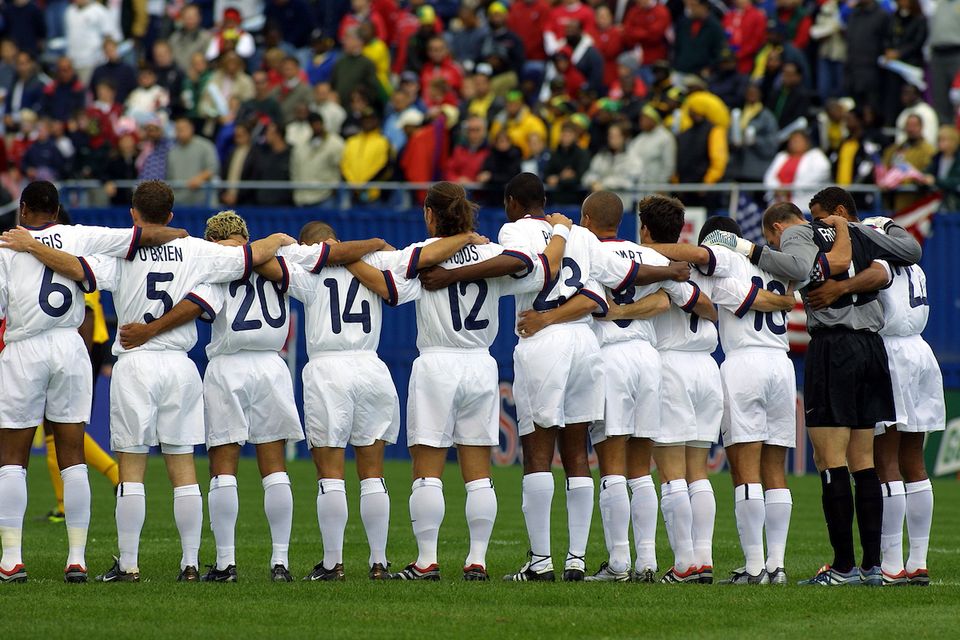
"It was very emotional," Reyna recalled. "It was the first time we had all gotten together as a group after September 11th. We're playing a game with the opportunity of getting a step closer to the World Cup but more than anything, we were playing for something more than ourselves and something bigger. Before the game Bruce told us that we would just that day began the invasion. He felt he wanted to let us know not in terms of something to motivate us, but I just think he thought it was something that we needed to know as Americans back then."
Despite the three-straight losses, the USMNT also still had a path, albeit miniscule, to qualification on the day as two other results needed to go their way.
"The mission was simple," Stewart said. "We had to win games and then you have to wait on the rest that you don't have any influence on. You try to block that out for as much as possible because it doesn't help the game."
With the match barely four minutes old, the U.S. gave 40,483 fans something to cheer about. Reyna sent a free kick toward the near post and a diving Moore headed the ball home from six yards. The Reggae Boyz retaliated 10 minutes later, as James Lawrence took advantage of sloppy marking to beat Friedel.
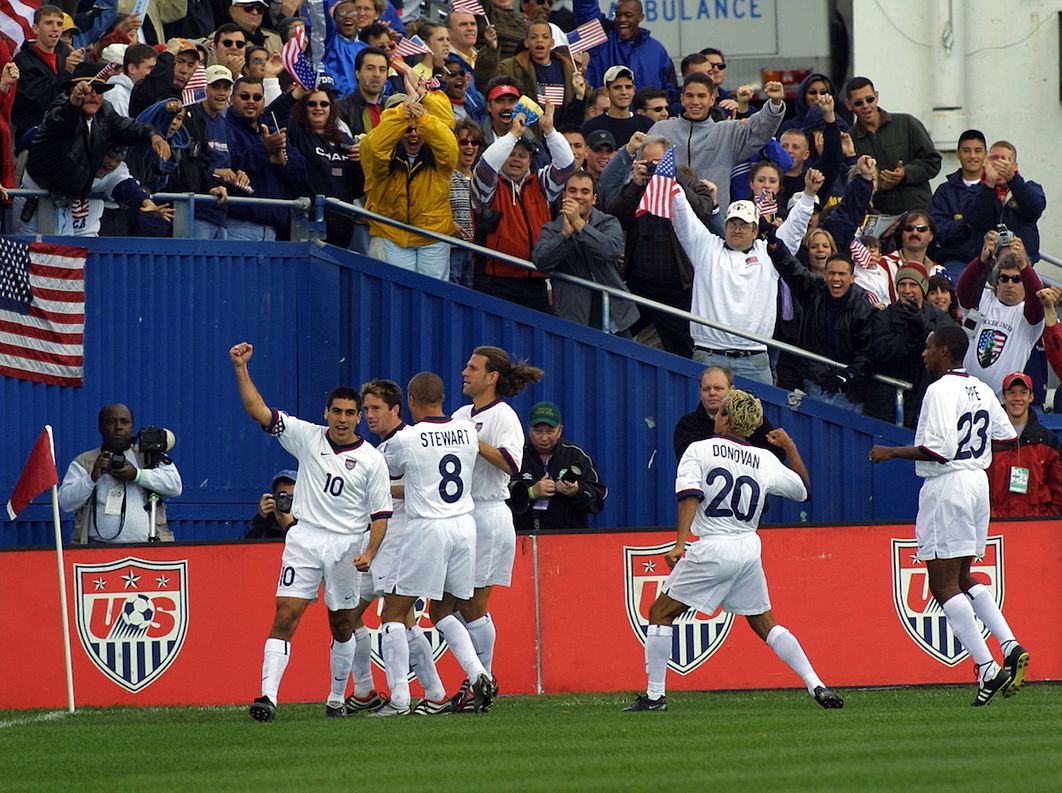
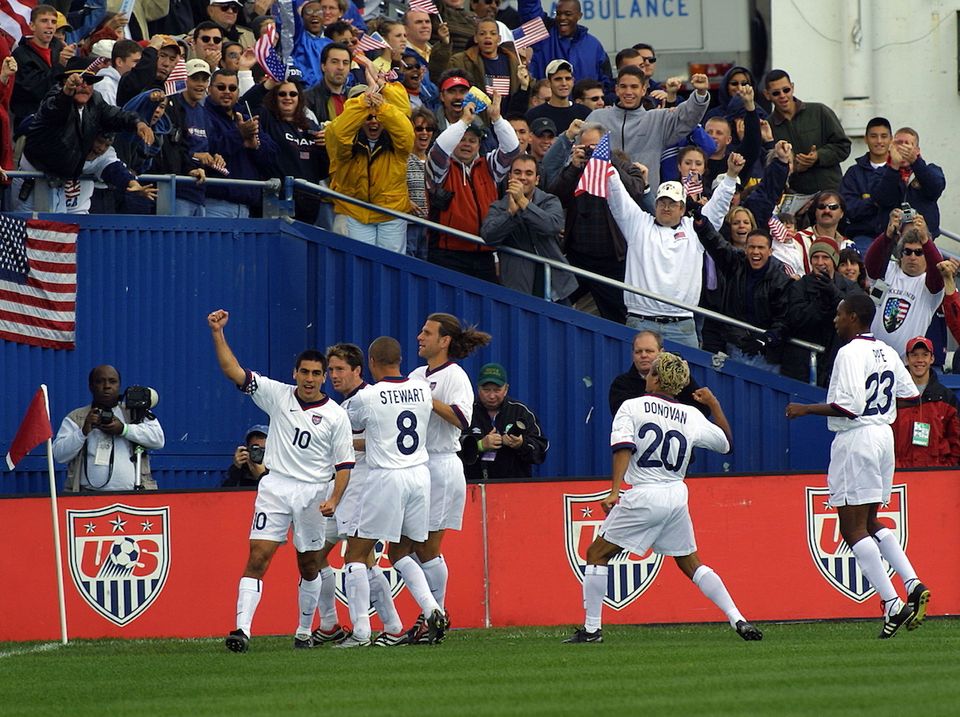
In the 81st minute, Tyrone Marshall took down Donovan on the right side of the penalty area for a PK. The team hadn't converted its three penalties during Arena's WCQ tenure.
Moore volunteered, powering a low, right-footed shot into the lower right corner.
"I think Bruce had chosen Claudio or Earnie [Stewart] and I to take any penalties that day, so when Landon got taken down in the box, I just remember looking at those guys and saying 'I feel good,' " Moore said. "After I scored, my reaction was a little strange, but that was ust in response to one of the Jamaican players talking some smack before I took it. He said something nasty to try and throw me off."
After Moore's penalty, there were rumors in the stadium that the USA had already qualified.
"Someone was warming up behind the goal said to me like, 'Waste as much time as you can. We've qualified,' " Friedel said.
In the fifth minute of stoppage time, referee Rodolfo Sibrian whistled the match over and the U.S. earned a 2-1 victory. Minutes later, press officer Michael Kammarman informed the team, which was saluting the fans, about two final scores:
Costa Rica 0, Mexico 0
Trinidad & Tobago 1, Honduras 0
Those results boosted the U.S. into the World Cup. The final qualifier in Trinidad on Nov. 11 became moot.
"All of a sudden you've accomplished what you've set out to do," Stewart said. "It just gives an amazing feeling that you're going back to the world stage once again because [you're going to] compete with those players; the best in the world."
Reyna, a member of four World Cup teams, agreed.
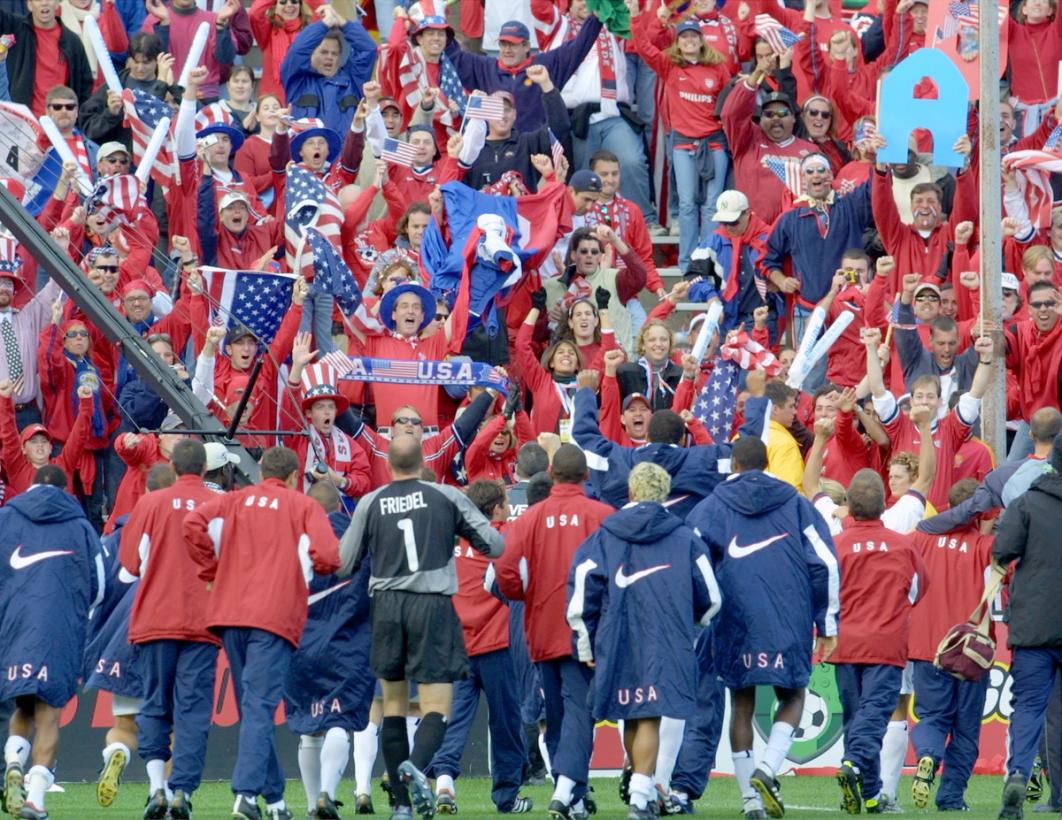
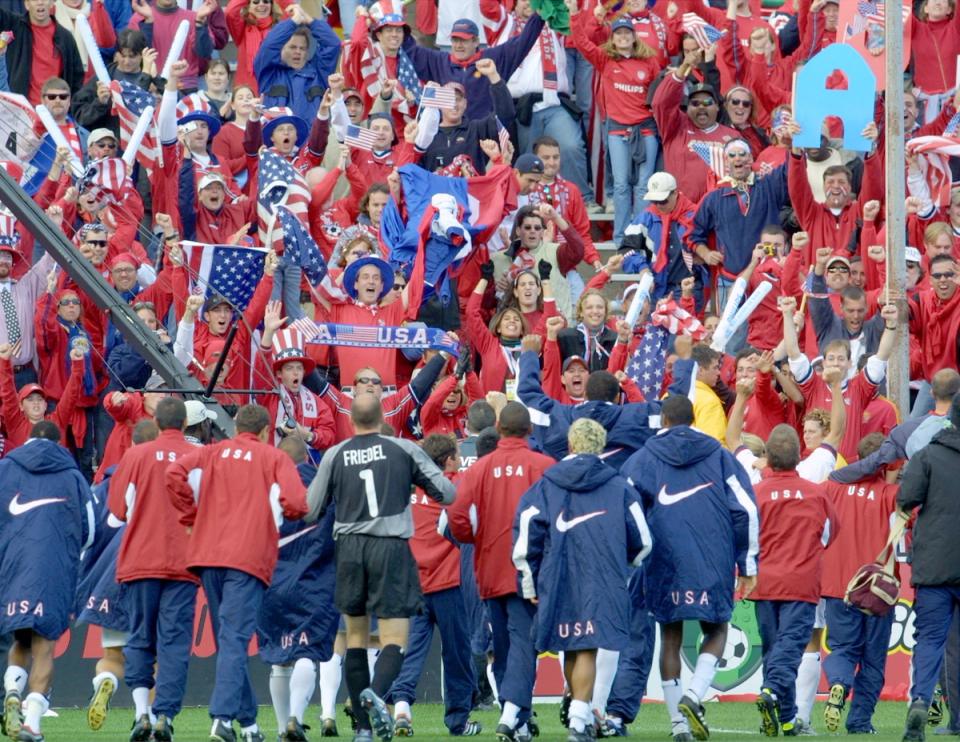
"Going to go to another World Cup was amazing," he said. "All the qualifications I've been through, it's a challenge. It’s very rewarding to qualify for World Cups because you just never know. If I can get to play in one, it would be incredible. So, every opportunity you get you're just so thankful.
“What happened that day was special. We could take people's mind off what happened, represent the country well and in a way have a big success for the country was needed. Sports brought everybody back after 9/11. We felt we played our part as well."